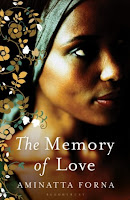As someone who is from the country the book is set in, I found the setting and characters interesting though not always believable. There are certain cultural subtleties that Ms. Forna misses in her depiction of Sierra Leoneans, given that it is a work of fiction, I appreciate that there has to be some leeway, nonetheless I think that most Sierra Leoneans reading this book will question a few of her literary choices. For instance, the dynamics of different ethnic groups; one can make the assumption that the main character Elias Cole is a Krio who marries a non-Krio, perhaps a Temne and has a daughter whose name sounds Fulani. Though not impossible, it's highly unlikely that a Krio man would give his daughter a name that reflects neither his nor his wife's ethnicity. Also the fact that Elias Cole has no 'people' - throughout the novel I couldn't help but question where are his people, in a society where the norm is for people to live with their extended family, here is a man whose only relation is with his house help. These are perhaps subtleties that only someone from the country will appreciate and while they do not carry a great deal of weight, the novel loses a little bit of its credibility as a depiction of a real country in a real time period.
I admit it may be overly simplistic to say so but I've never understood the choice of authors to make their protagonist an anti-hero, I can't help but think why waste your first person narrative on someone who the reader is not going to like. The main character, Elias Cole in The Memory of Love is thoroughly unlikeable, he does not seem to have a single redeeming quality. Even his love/lust for his friend's wife evokes no sympathy from us as he's seen as sneaky, deceitful, almost preying on her. His relationship with his daughter which could be a way of making Elias more human, flawed but with some positive character traits, is tainted by an unforgiveable act which he has committed in her childhood and for which she refuses to forgive him. I get the impression that the author is both judge and jury in the novel - according to an interview she gives promoting the book, the character of Elias came about as she questioned how it is that some people not only survive adversity but seem to thrive from it. As a result the reader is asked to judge Elias as she judges him or people like him. Yet for those who have been through adversities, in particular war, I'm certain their stories are far from straightforward - I suspect there is an element of a desire to survive in all of us which can make us act in a less than honourable manner.
The story of war, and its aftermath is dealt with in a way I think that doesn't make it 'yet another account of an African country's brutal past'. The question of post-war trauma is cleverly addressed and raises questions that are rarely raised in particular about how post-conflict countries address the mental health issue. However I don't agree with the 'neat analysis' of Sierra Leoneans as being unwilling to talk about their experiences, certainly in the case of the Truth and Reconciliation Committee and the Special Court for Sierra Leone; unlike many other post-conflict societies, victims were willing to open up and talk about their experiences, however gruesome. By stark contrast to Rwandans dealing with the aftermath of the genocide, Sierra Leoneans were quite open and expressive and talked freely about the war except perhaps where cultural taboos prevented them from doing so.
I think The Memory of Love is well-written, Aminatta Forna is a meticulous storyteller and the novel is enjoyable and informative.
The Memory of Love

Interesting to read a review from a Sierra Leonean's point of view. I've learnt some things :-)
ReplyDeleteI also wondered at Forna's decision to make the despicable Elias Cole a protagonist, but in the end, it made for interesting reading and a more complete picture of a country in wartime.
I particularly liked that she addressed the mental health issue. What kind of "cultural taboos" would prevent people from opening up?
You can read my review here, if you like : http://pixelstories.wordpress.com/2011/06/10/im-cheating-on-zadie-smith/